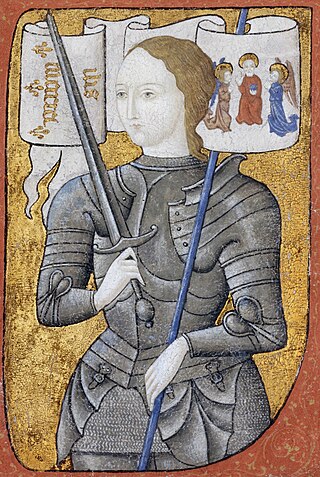
Joan of Arc is a patron saint of France, honored as a defender of the French nation for her role in the siege of Orléans and her insistence on the coronation of Charles VII of France during the Hundred Years' War. Claiming to be acting under divine guidance, she became a military leader who transcended gender roles and gained recognition as a savior of France.
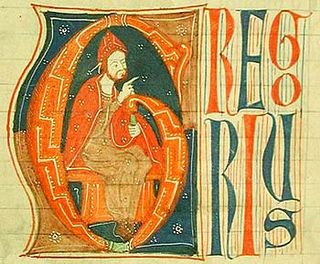
The Medieval Inquisition was a series of Inquisitions from around 1184, including the Episcopal Inquisition (1184–1230s) and later the Papal Inquisition (1230s). The Medieval Inquisition was established in response to movements considered apostate or heretical to Roman Catholicism, in particular Catharism and Waldensians in Southern France and Northern Italy. These were the first movements of many inquisitions that would follow.

The siege of Orléans was the watershed of the Hundred Years' War between France and England. The siege took place at the pinnacle of English power during the later stages of the war. The city held strategic and symbolic significance to both sides of the conflict. The consensus among contemporaries was that the English regent, John of Lancaster, would have succeeded in realising his brother the English king Henry V's dream of conquering all of France if Orléans fell. For half a year the English and their French allies appeared to be winning, but the siege collapsed nine days after the arrival of Joan of Arc.
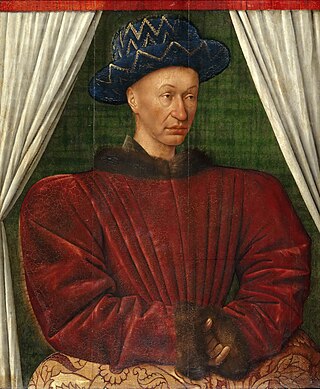
Charles VII, called the Victorious or the Well-Served, was King of France from 1422 to his death in 1461.

Jean Dorothy Seberg was an American actress who lived half of her life in France. Her performance in Jean-Luc Godard's 1960 film Breathless immortalized her as an icon of French New Wave cinema.

Pierre Cauchon was Bishop of Beauvais from 1420 to 1432. He was a strong partisan of English interests in France during the latter years of the Hundred Years' War. He was the judge in the trial of Joan of Arc and played a key role in her execution. The Catholic Church overturned his verdict in 1456.

Étienne de Vignolles, Sieur de Montmorillon, Chatelain de Longueville, also known as La Hire, was a French military commander during the Hundred Years' War.

The Messenger: The Story of Joan of Arc is a 1999 English-language French epic historical drama film directed by Luc Besson and starring Milla Jovovich, John Malkovich, Faye Dunaway and Dustin Hoffman. The screenplay was written by Besson and Andrew Birkin, and the original score was composed by Éric Serra.

Bonjour Tristesse is a 1958 British-American Technicolor film in CinemaScope, directed and produced by Otto Preminger from a screenplay by Arthur Laurents based on the novel of the same name by Françoise Sagan. The film stars Deborah Kerr, David Niven, Jean Seberg, Mylène Demongeot and Geoffrey Horne, and features Juliette Gréco, Walter Chiari, Martita Hunt and Roland Culver. It was released by Columbia Pictures. This film had color and black-and-white sequences, a technique unusual for the 1950s, but widely used in silent movies and early sound movies.
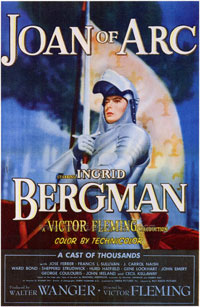
Joan of Arc is a 1948 American hagiographic epic film directed by Victor Fleming, and starring Ingrid Bergman as the eponymous French religious icon and war heroine. It was produced by Walter Wanger and is based on Maxwell Anderson's successful Broadway play Joan of Lorraine, which also starred Bergman, and was adapted for the screen by Anderson himself, in collaboration with Andrew Solt. It is the only film of an Anderson play for which the author wrote the film script. It is the last film Fleming directed before his death in 1949.
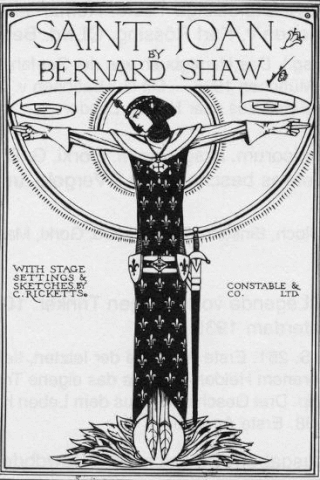
Saint Joan is a play by George Bernard Shaw about 15th-century French military figure Joan of Arc. Premiering in 1923, three years after her canonization by the Roman Catholic Church, the play reflects Shaw's belief that the people involved in Joan's trial acted according to what they thought was right. He wrote in his preface to the play:
There are no villains in the piece. Crime, like disease, is not interesting: it is something to be done away with by general consent, and that is all [there is] about it. It is what men do at their best, with good intentions, and what normal men and women find that they must and will do in spite of their intentions, that really concern us.
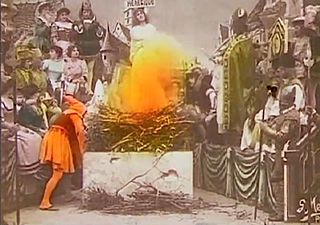
Joan of Arc is a 1900 French silent film directed by Georges Méliès, based on the life of Joan of Arc.
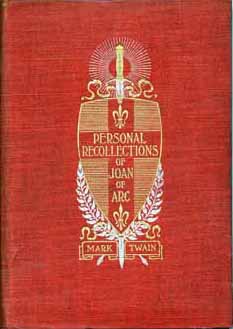
Personal Recollections of Joan of Arc, by the Sieur Louis de Conte is an 1896 novel by Mark Twain which recounts the life of Joan of Arc.

Joan of Arc is a 1999 Canadian two-part television miniseries about the 15th-century Catholic saint of the same name. The miniseries stars Leelee Sobieski as Saint Joan. A joint production of the Canadian Broadcasting Corporation and Alliance Atlantis Communications, it was shown internationally in 1999.

The Trial of Joan of Arc was a 15th century legal proceeding against Joan of Arc, a French military leader under Charles VII during the Hundred Years' War. During the siege of Compiègne in 1430, she was captured by Burgundian forces and subsequently sold to their English allies. She was prosecuted by a pro-English church court at Rouen, Normandy in 1431. The court found her guilty of heresy and she was burned at the stake. The verdict was later nullified at Joan's rehabilitation trial, which was overseen by the Inquisitor-General, Jean Bréhal, in 1456. Considered a French national heroine, she was declared a saint by the Roman Catholic Church in 1920. The trial is one of the most famous in history, becoming the subject of many books and films.

Joan of Arc, a French historical figure executed by the English for heresy in 1431, is a national heroine of France and a Roman Catholic saint. Joan accompanied an army during the Hundred Years War, adopting the clothing of a soldier, which ultimately provided a pretense for her conviction and execution. Whether her crossdressing and lifestyle have implications for her sexuality or gender identity is debated.

The conviction of Joan of Arc in 1431 was posthumously investigated on appeal in the 1450s by Inquisitor-General Jean Bréhal at the request of Joan's surviving family – her mother Isabelle Romée and two of her brothers, Jean and Pierre. The appeal was authorized by Pope Callixtus III.

French history has been the basis of plays in the English-speaking theatre since the English Renaissance theatre.
Saint Joan is a 1967 American TV film adaptation of the 1923 George Bernard Shaw play Saint Joan for the Hallmark Hall of Fame. It was directed by George Schaefer.


















